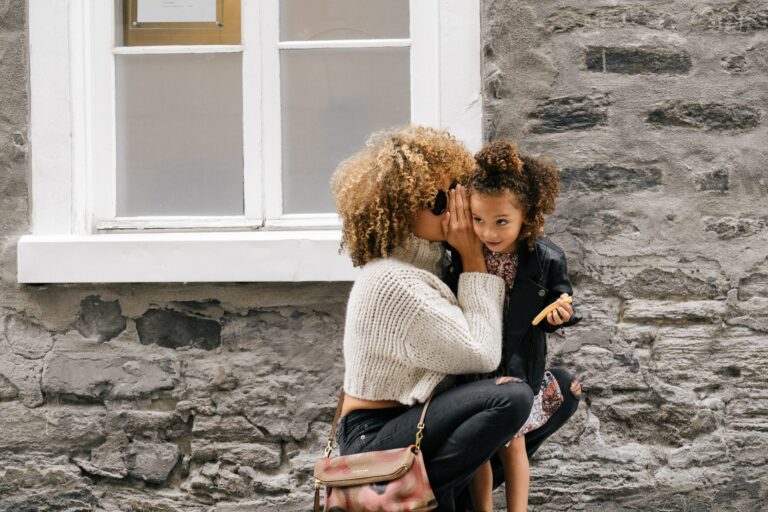How often are you fully present with your child with your full, complete attention?
You might spend a lot of time with your kids, but during this time, are you fully present with them? Or are you mostly managing their lives, tending to schedules, getting them ready, driving them around?
Are you spending more of your day struggling with your kids than enjoying them?
Connecting with your children means being fully present with your attention and awareness. If you are distracted or anxious or worried about something, you’re not present. Your kids can feel it when you’re not really with them.
Empathy is your magic wand
Empathy is your magic wand that can change your relationship with your kids. Empathy is putting yourself in another’s shoes – to really understand their perspective and what they are feeling. Empathy leads to connection and trust. Children need to feel valued, listened to, and honored for their unique selves. When you give this type of quality attention to your children, you validate them.
Enter their world through fun and play
If you can enter your child’s world through fun and play, letting them lead the way, you can create a deeper sense of closeness and connection. In addition to playing with your child, you can enjoy each other by creating art, taking walks, laughing and snuggling. Or simply join your child in whatever they most love to do.
But really? How easy is it to show up in this way when you’ve got responsibilities, schedules, tons to do, and a lot to worry about? How much room do you have in your life for fun and games?
This is why it’s so important to prioritize your own needs. When you make it a priority to take care of yourself and you have specific tools to help you stay centered, you might be surprised at how much more energy, creativity and focus you gain just by playing with your kids.
But sometimes you just don’t feel like playing!
Active listening is a great way to connect. In your busy day, you can look for opportunities to listen to your child.
What if you could stop what you’re doing, get to eye level with your child, and listen with so much presence that you feel like your heart is going to explode?
How to actively listen to your child
Begin with a clear, open curious mind
Get rid of distractions – turn off your phone, the TV, and let your child know it’s their time to talk. Let your natural curiosity take over and bring yourself into a mindset that you are seeking to fully understand. Try to let go of the need to hear what you want to hear so you can hear what is actually being said.
Listen with Presence
Have a clear intent to slow down and listen to your child’s voice as if it were the most precious thing you’ve ever heard. Listen to what is being said in words as well as what is being communicated non-verbally with body language.
Don’t interrupt
Try to notice how often you interrupt your kids. Their brains may process more slowly than yours. They can take a lot more time to process their thoughts – and sometimes they talk around in circles. Can you listen to your child’s natural processing without interrupting them and taking control of the conversation?
We teach our children by modeling. Are you modeling interruption? When our children tell us their feelings, their stories, and their fears, can you listen and do nothing but hear them? No fixing. No rescuing. Just hear them.
Refrain from Labels and Judgement
It can be difficult to listen to your children without judgement. Notice when you have labels or judgements come up in your mind. Maybe you’re thinking thoughts like “gosh why does this kid have to be so obnoxious and loud?” or, “he doesn’t ever tell the truth” or “why is she such a drama queen?”. Judgements and labels are deeply conditioned within us, especially as we see our children. But they block our listening, and they don’t help to create a healthy relationship.
Refrain from Comparison
Notice when you are comparing your child to someone else. Maybe this is their brother, sister, or friend. Can you unconditionally accept your child as their own unique self?
Reflect back what they said
Repeat back what your child said to let them know you heard them. It doesn’t need to be the entire thing they said – just repeat some of their words or summarize enough for them to know you get what they are saying. You can ask them – “did I get that right?”
Hearing you repeat their words might be all they need to feel seen, heard and appreciated. For some kids, you may need to help them understand why you are repeating their words back so it’s not confusing for them. “I’m working on hearing what you’re saying more accurately.”
Give empathy
As tempting as it might be, don’t try to fix the situation in that moment. Give empathy instead.
Allow them the space to share, and when they are done, here are some things you can say:
How was that for you?
Is there anything else you’d like to share about this?
I understand.
I get it.
I hear you.
Listening to children does not mean you have to agree with them. You are simply allowing them to voice their feelings, opinions, and needs. This opens a dialog in which you can both share what you need and are willing – or not willing – to do.
The more you can give your children your undivided attention and deeply listen to them, the easier and more joyful your parenting experience will be.
Learn What to Do to Resolve Your Child’s Troubling Behavior
Understand the cause of the behavior
Know what to do for yourself in those really stressful parenting moments
Know what to do for your child to bring them back to calm and cooperation
Enter your email to watch the video and receive emails with strategies that work.


